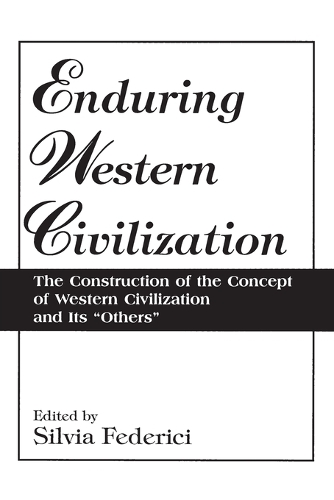
Enduring Western Civilization: The Construction of the Concept of Western Civilization and Its Others
(Paperback)
Available Formats
Publishing Details
Enduring Western Civilization: The Construction of the Concept of Western Civilization and Its Others
By (Author) Silvia Federici
Bloomsbury Publishing PLC
Praeger Publishers Inc
24th October 1995
United States
Classifications
Tertiary Education
Non Fiction
General and world history
909.09821
Physical Properties
Paperback
224
Width 156mm, Height 235mm
369g
Description
What do we mean by Western Civilization When did the expression originate and why At a time when there is a widespread perception that Western Civilization is undergoing a historic crisis, and when postmodernism, feminist theory, afrocentrism, deconstruction, and other current philosophical schools define themselves as alternatives to, or critiques of, Western Civilization, this book seeks to trace the development of the concept of Western Civilization and to examine the reasons for its endurance. It also suggests ways in which proponents of Western Civilization can co-opt ideas from opponents. Written from a multidisciplinary viewpoint, the essays in this volume trace the development of the concept of Western Civilization and seek to explode many standing beliefsprimarily those which concern the very existence of a Western tradition. Bound to be controversial, the book will be of interest to scholars and activists in the fields of cultural history, anthropology, and the history of ideas, as well as general readers interested in the enduring discussion of the notion of Western Civilization.
Reviews
"Many of us teachers of "western civilization.,."are caught in an implacable vise: on the one hand, the conservative bullies bray for a bigoted version of the past, or various groups demand "affirmative action" by inclusion in the liberal version of the historical grand narrative and the resulting culture wars produce much sound and fury. On the other hand, our students, often approaching history for the very first time, eagerly want a clear narration of our story so that they can have some common sense in facing the future that awaits them. "Enduring Western Civilization must become an essential supplement to every teacher who works with this dilemma. It contains original works of scholarship by authors who are distinguished for their creativity and rigor. It is diamond that cannot be crushed in the vise I have mentioned; indeed, it can help us to pry it open."-Peter Linebaugh, University of Toledo
"This book exposes the cliches that have moved from imperialism to postcoloniality, from Eurocentrism to multiculturalism. It is a well-documented guide to new research agendas and to a pedagogy that is enlightened beyond mere polemic."-Gayatri Chakravorty Spivak, Columbia University
Author Bio
SILVIA FEDERICI is Associate Professor of Philosophy and International Studies at Hofstra University.
